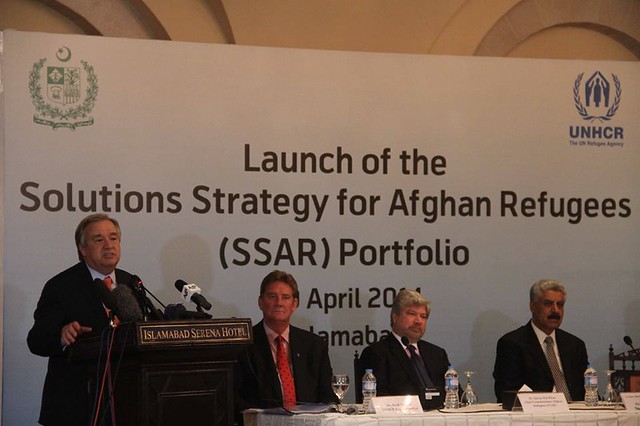By Aslam Chandio, TwoCircles.net,
Islamabad: The Pakistan’s Ministry of States and Frontier Regions (SAFRON) and the UN Refugee Agency have launched the Pakistan Portfolio of projects under the Solutions Strategy for Afghan Refugees (SSAR) seeking USD 367 million from the donor community for the future implementation of these projects across Pakistan.
The launching ceremony for the Solutions Strategy for Afghan Refugees (SSAR) Portfolio was held here in Islamabad on Wednesday.

UN High Commissioner for Refugees, Antonio Guterres addressing the audience during launching ceremony for the Solutions Strategy for Afghan Refugees (SSAR) Portfolio held in Islamabad.
The UN High Commissioner for Refugees, Antonio Guterres asserted at the launching ceremony, “The projects in this Portfolio will address the humanitarian and developmental basic needs of both refugees and host communities in Pakistan.”
The proposed projects vary in scope and size, and will be implemented in refugee hosting areas as well as districts that have hosted refugees in past, in all four provinces and the Federally Administered Tribal Areas. These projects are part of the regional SSAR which was endorsed by the UN, the Governments of the Pakistan, Afghanistan and Iran, and the donor community in May 2012 at Geneva.
The UN High Commissioner for Refugees lauded the government and the people of Pakistan for their continuous support to Afghan refugees despite the challenges posed by their protracted stay. “With the return of Afghan refugees at its lowest level since the voluntary repatriation programme began in 2002, Pakistan’s generosity needs to be matched by others in the true spirit of international burden-sharing,” Antonio Guterres added.
The SSAR is a multi-year strategy to find solutions for the world’s most protracted refugee caseload – Afghan refugees. The voluntary repatriation and sustainable reintegration of Afghan refugees in Afghanistan remains at the centre of this strategy, which also focuses on support to host refugee communities in Pakistan and Iran, as well as on increase resettlement to third countries, as concrete demonstrations of international burden-sharing.
The Portfolio prioritizes improving access to education and health for the host and refugee communities in order to encourage peaceful co-existence. The projects also aim to enable refugees to repatriate voluntarily by empowering them with vocational and livelihood skills that will assist them to attain sustainable reintegration in Afghanistan upon return.
Pakistan’s Federal Minister for States and Frontier Regions (SAFRON) Lt. Gen. (R) Abdul Quadir Baloch expressed gratitude to UNHCR and the donor community for continuously assisting Pakistan’s refugee programmes. He, however, urged the international community to give more support, enable voluntary return and reintegration, as the situation of the refugees becomes more protracted.
“The international community should share Pakistan’s burden by not only supporting and addressing the needs of those areas affected by the long presence of refugees in Pakistan, but also by focusing on Afghanistan to create pull factors so that more refugees return and contribute to their national development,” the Federal Minister added.
The Federal Minster explained that he and the UNHCR‘s High Commissioner will conduct joint visits to engage with non-traditional donors, such as the Gulf Cooperation Council (GCC) countries, to raise funds to implement projects in the Portfolio.
The five main sectors for project interventions are: voluntary repatriation, unhindered access to shelter and essential social services, improved livelihood opportunities and food security, environmental protection of refugees and support to host communities, and capacity building of national authorities.

Pakistan’s Federal Minister for States and Frontier Regions Lt. Gen. (R) Abdul Quadir Baloch and UN High Commissioner for Refugees, Antonio Guterres show Solutions Strategy for Afghan Refugees (SSAR) Portfolio.
Both UN High Commissioner for Refugees and the Pakistan government reiterated their commitment to the voluntary and gradual nature of repatriation. Since UNHCR started assisting voluntary returns to Afghanistan in 2002, more than 3.8 million Afghans have returned home from Pakistan. Pakistan continues to host some 1.6 million registered Afghan refugees, which remains one of the world biggest refugee populations.
Antonio Guterres also called on President of the Pakistan Mamnoon Hussain on Wednesday. The Pakistan’s President appreciated the UNHCR work on repatriation of Afghan Refugees but added that more needs to be done.
Antonio Guterres briefed the President on UNHCR’s ongoing projects for repatriation of afghan refugees. He said that the presence of Afghan refugees in Pakistan for such a long time was the most remarkable example of hospitality. Both sides discussed a wide range of issues pertaining to the repatriation and management of Afghan Refugees in Pakistan.
(Aslam Chandio is an Islamabad based journalist. He tweets at @aslamchandio_ )

